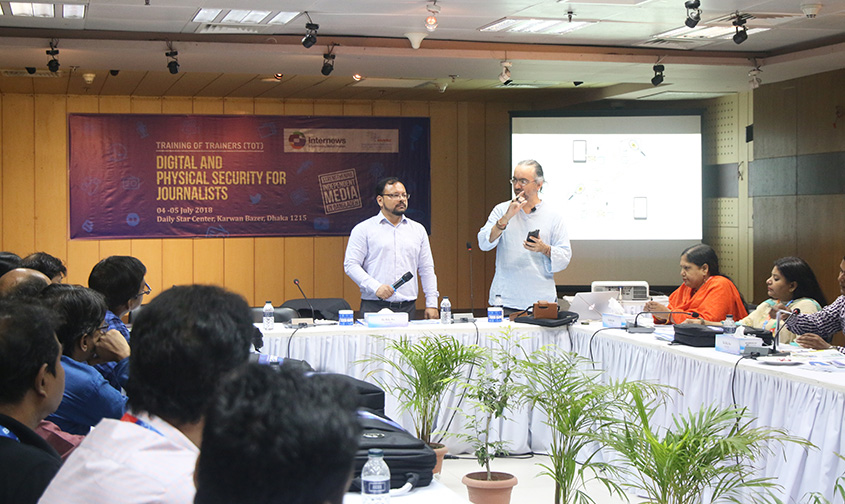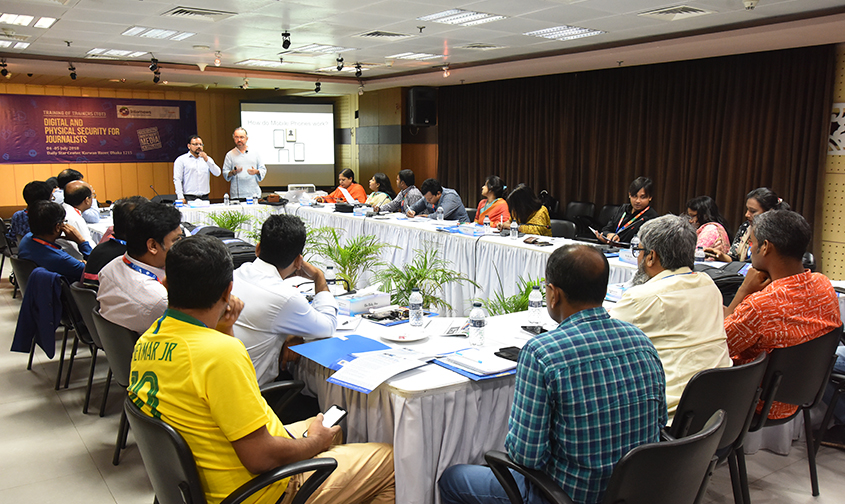

Name of the Project: Advancing Access to Reliable Information (AARI)
Partnership: Internews
Duration: January 2019 to August 2020
Background
Journalists across the world face deep dilemmas when it comes to reporting on conflicts that are occurring in and sometimes devastating the communities in which they live and work. Every day they respond to the challenges of being part of communities caught up in conflict while at the same time being part of a profession that expects fair and even-handed coverage of these conflicts.
In Bangladesh, journalists face similar dilemmas while covering news if not in the same magnitude. Political violence and non-political violence are major concerns for newsmen who cover events involving physical confrontation. There are occasions when reporters are seemingly left with no choice but to report one side of the story because of the difficulties in accessing information, resulting in a compromise with accuracy, balance and truth of the incident.
The Conflict Sensitive Journalism encouraged journalists to recognize that they can make a constructive difference in conflict, whether it is armed conflict, political or socio-economic conflict, and that they can do so without compromising their roles as providers of fair, accurate and responsible reporting. The journalists to recognize how they may unwittingly exacerbate conflict and encourage them to consider the impact of certain practices. It helped journalists to see how, by enhancing their understanding of conflict and the theories that explain it, they can provide more informed, accurate and comprehensive coverage. It also provided some simple but useful tips and points that can assist journalists in reporting effectively on conflict.
Internews and BNNRC works on the basic conflict sensitive journalism and fact checking during the Rapid Response to include a new cohort of journalists selected from regional and national media outlets who cover the refugee crisis. The necessary skills and knowledge to maintain professional standards while covering the Rohingya crisis and conflict situations in general, thus aiding peace-building and reconciliation processes. They will do best practices of conflict sensitivity such as the ‘Do no harm principle’ and conflict prevention along with an understanding of the tools needed to debunk rumors and verify images and video.
AARI communicates with audiences to hear key information and messages from multiple sources (message repetition). The provision of fact-based, conflict sensitive, practical information will inform critical decision-making within the refugee community, help to shape the attitudes and perceptions of host communities towards refugees, and diffuse tensions that quickly lead to conflict.
Bangladeshi news organizations are covering complex issues such as the Rohingya influx. Therefore, to increase understanding of conflict sensitivity, Bangladesh NGOs Network for Radio & Communication (BNNRC) is implementing Advancing Access to Reliable Information (AARI) project with support from Internews on conflict sensitive journalism for journalists in Cox’s Bazar in an around.,
Project objective: Increase access to critical fact-based, conflict-sensitive information for both the host and refugee communities in and around Cox’s Bazaar.
Intermediate results
- Media in CxB and surrounding communities have the capacity to produce fact-based, conflict sensitive content
- Reduced systematic exclusion of vulnerable groups from media and critical information
Outcome of the project
- Improved ability of CxB station staff to consistently apply new skills in radio broadcast production
- Improved ability of CxB station staff to support the production of conflict sensitive coverage of the Rohingya crisis
- Increased information on an emerging human rights crisis to inform HRSM current programming and development of new projects
- Improved early warning, monitoring, and reporting of human rights violations and abuses
- Improved awareness and understanding of human rights
Activities
- Training and mentoring for 3 radio stations serving the CxB area in technical aspects of production, and provision of equipment to strengthen and extend broadcast signal
- Engagement with local, regional, and national media outlet managers and editors to increase interest and buy-in for institutionalizing conflict sensitive practices at the newsroom level
- Advanced training for journalists in conflict sensitive and content production
- Advanced training for journalists in fact checking and verification
- Regional conference on addressing/combatting misinformation and promoting conflict sensitivity for content producers
- Audio content production (“Talking Peace” and 3 other program types targeting women and youth) and distribution via listening groups, podcasts, and mobile phones, community level feedback loops within CxB and surrounding communities; weekly bulletins distributed to CxB stakeholders
- Community level outreach and engagement (particular focus on youth) to build peace, reduce tensions, and work with youth to make them more critical consumers of information from media and other sources.
Timeline: January 2019 to August 2020
Budget: BDT-211,66,735
NGO Affairs Bureau
Approved: FD-6


